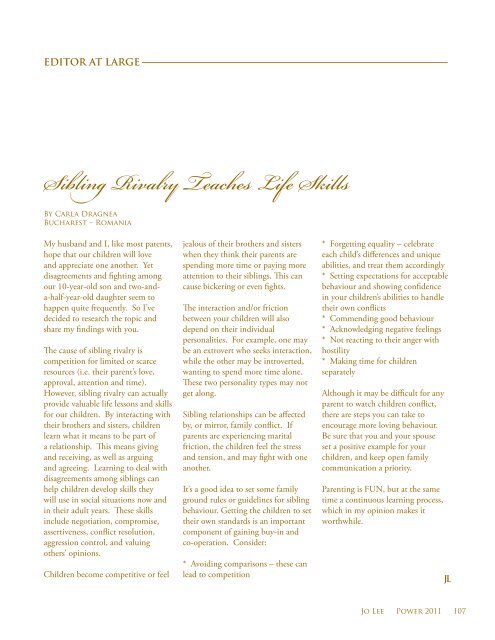Donna Saslove And Simon Lugassy - JO LEE Magazine
Donna Saslove And Simon Lugassy - JO LEE Magazine
Donna Saslove And Simon Lugassy - JO LEE Magazine
You also want an ePaper? Increase the reach of your titles
YUMPU automatically turns print PDFs into web optimized ePapers that Google loves.
EDITOR AT LARGE<br />
Sibling Rivalry Teaches Life Skills<br />
By Carla Dragnea<br />
Bucharest – Romania<br />
My husband and I, like most parents,<br />
hope that our children will love<br />
and appreciate one another. Yet<br />
disagreements and fighting among<br />
our 10-year-old son and two-anda-half-year-old<br />
daughter seem to<br />
happen quite frequently. So I’ve<br />
decided to research the topic and<br />
share my findings with you.<br />
The cause of sibling rivalry is<br />
competition for limited or scarce<br />
resources (i.e. their parent’s love,<br />
approval, attention and time).<br />
However, sibling rivalry can actually<br />
provide valuable life lessons and skills<br />
for our children. By interacting with<br />
their brothers and sisters, children<br />
learn what it means to be part of<br />
a relationship. This means giving<br />
and receiving, as well as arguing<br />
and agreeing. Learning to deal with<br />
disagreements among siblings can<br />
help children develop skills they<br />
will use in social situations now and<br />
in their adult years. These skills<br />
include negotiation, compromise,<br />
assertiveness, conflict resolution,<br />
aggression control, and valuing<br />
others’ opinions.<br />
Children become competitive or feel<br />
jealous of their brothers and sisters<br />
when they think their parents are<br />
spending more time or paying more<br />
attention to their siblings. This can<br />
cause bickering or even fights.<br />
The interaction and/or friction<br />
between your children will also<br />
depend on their individual<br />
personalities. For example, one may<br />
be an extrovert who seeks interaction,<br />
while the other may be introverted,<br />
wanting to spend more time alone.<br />
These two personality types may not<br />
get along.<br />
Sibling relationships can be affected<br />
by, or mirror, family conflict. If<br />
parents are experiencing marital<br />
friction, the children feel the stress<br />
and tension, and may fight with one<br />
another.<br />
It’s a good idea to set some family<br />
ground rules or guidelines for sibling<br />
behaviour. Getting the children to set<br />
their own standards is an important<br />
component of gaining buy-in and<br />
co-operation. Consider:<br />
* Avoiding comparisons – these can<br />
lead to competition<br />
* Forgetting equality – celebrate<br />
each child’s differences and unique<br />
abilities, and treat them accordingly<br />
* Setting expectations for acceptable<br />
behaviour and showing confidence<br />
in your children’s abilities to handle<br />
their own conflicts<br />
* Commending good behaviour<br />
* Acknowledging negative feelings<br />
* Not reacting to their anger with<br />
hostility<br />
* Making time for children<br />
separately<br />
Although it may be difficult for any<br />
parent to watch children conflict,<br />
there are steps you can take to<br />
encourage more loving behaviour.<br />
Be sure that you and your spouse<br />
set a positive example for your<br />
children, and keep open family<br />
communication a priority.<br />
Parenting is FUN, but at the same<br />
time a continuous learning process,<br />
which in my opinion makes it<br />
worthwhile.<br />
JL<br />
Jo Lee Power 2011 107

















